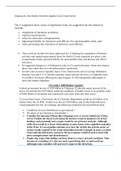Summary
Summary Gevurtz - The Role of Corporate Law in Preventing a Financial Crisis
- Course
- AP/SOSC 4043
- Institution
- York University (Ebor )
its a 7 page summary and notes of Gevurtz - The Role of Corporate Law in Preventing a Financial Crisis
[Show more]



